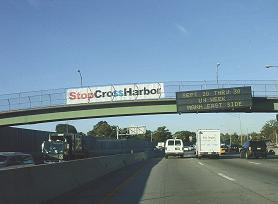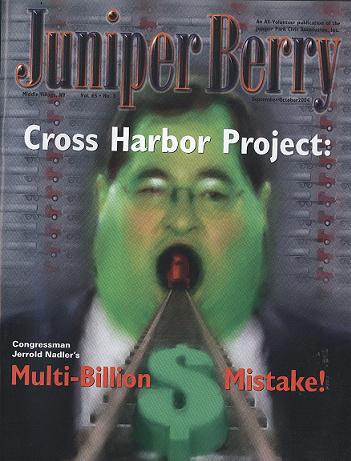If this project goes through it could be the end of any quality of life for Maspeth, Middle Village & Glendale.
Last May the New York City Economic Development Corporation, the Federal Highway Administration and the Federal Railroad Administration released the Draft Environmental Impact Statement (“DEIS”) for their proposed Cross Harbor Freight Movement Project. At a projected cost of several billions of dollars, the Project calls for (1) construction of a new freight rail tunnel from New Jersey to Brooklyn to accommodate either single or double trucks for movement of freight trains, and (2) construction of a massive new freight yard (called an intermodal facility) in Maspeth, where cargo containers can be transferred from freight trains to trailer trucks or be stored onsite.
The DEIS characterizes the Cross Harbor Project as having been developed with public input and bills the project as one that will spur economic growth and have significant environmental benefits. None of these claims are true. The public should be aware of the following facts concerning the Cross Harbor Project:
The Cross Harbor Project will require the federal government to take, through eminent domain, substantial acreage of private land in the Maspeth area, resulting in the forced relocation of scores of businesses and the thousands of people they employ.
The new intermodal facility proposed for Maspeth will result in thousands of additional truck trips each day through local neighborhoods, with resulting traffic congestion, danger to pedestrians and other vehicular traffic and air pollution. Fumes from idling diesel locomotives and trucks at the proposed intermodal facility will cause severe deterioration in air quality in the Maspeth/Middle Village area, including violations of health-based standards for particulates and nitrogen oxides.
Although the Project's proponents claim that increased movement of freight by rail will reduce truck traffic on the Hudson River crossings, thereby resulting in reductions in air pollution, the DEIS concedes that the Project will also result in an increase in truck traffic in Queens and on the East River crossings.
The Cross Harbor Project is based on the assumption that companies that currently move their goods by truck will shift to rail if there is a direct New Jersey – Brooklyn rail tunnel connection. However, the DEIS fails to support this assumption – an assumption that is crucial to determining the economics of the project. The DEIS fails to identify any company that will move its freight by rail rather than truck and does not provide any analysis in support of its contention that there will be an economic incentive for companies to divert their goods shipments from truck to rail.
The projected economic benefits of the Cross Harbor Project are also illusory. Any purported economic benefits are overshadowed by the fact that the project will result in the forced relocation of scores of Maspeth businesses that employ thousands of people. Furthermore, increased air pollution, traffic and noise and the filling of Maspeth and Newtown creeks are Project costs that the DEIS fails to include in its cost/benefit analysis. Additionally, the DEIS grossly understates the capital costs of the Cross Harbor Project; the projected costs do not include several crucial (and expensive) project components, such as the cost of the massive new freight storage structure that will be built as part of the double rail alternative – a structure that will likely cost over one billion dollars to construct.
In summary, the impacts of the Cross Harbor Project, in terms of economic dislocation, community and neighborhood character, air quality, noise, traffic, visual and aesthetic impacts, and overall quality of life, will be significant and irreversible. And the Cross Harbor project makes absolutely no sense from either an economic or environmental perspective.
Despite these facts, the agency proponents of the Project seek to squander billions of scarce public transposition funds on this ill-conceived Project. Join your neighbors in opposing this project, which will destroy businesses and neighborhoods in Queens, waste taxpayer dollars and worsen traffic, noise, and air pollution in our community.



